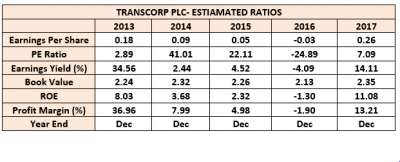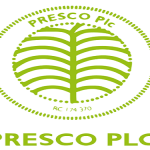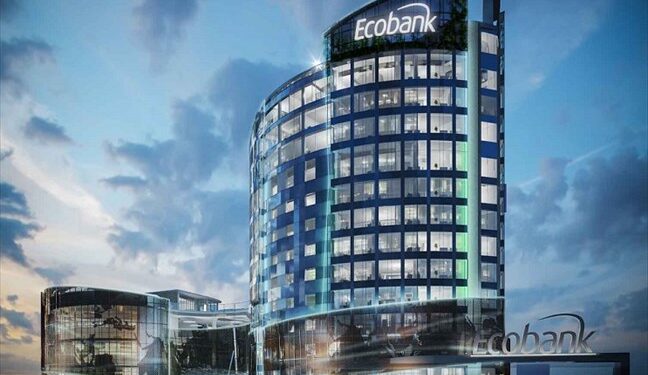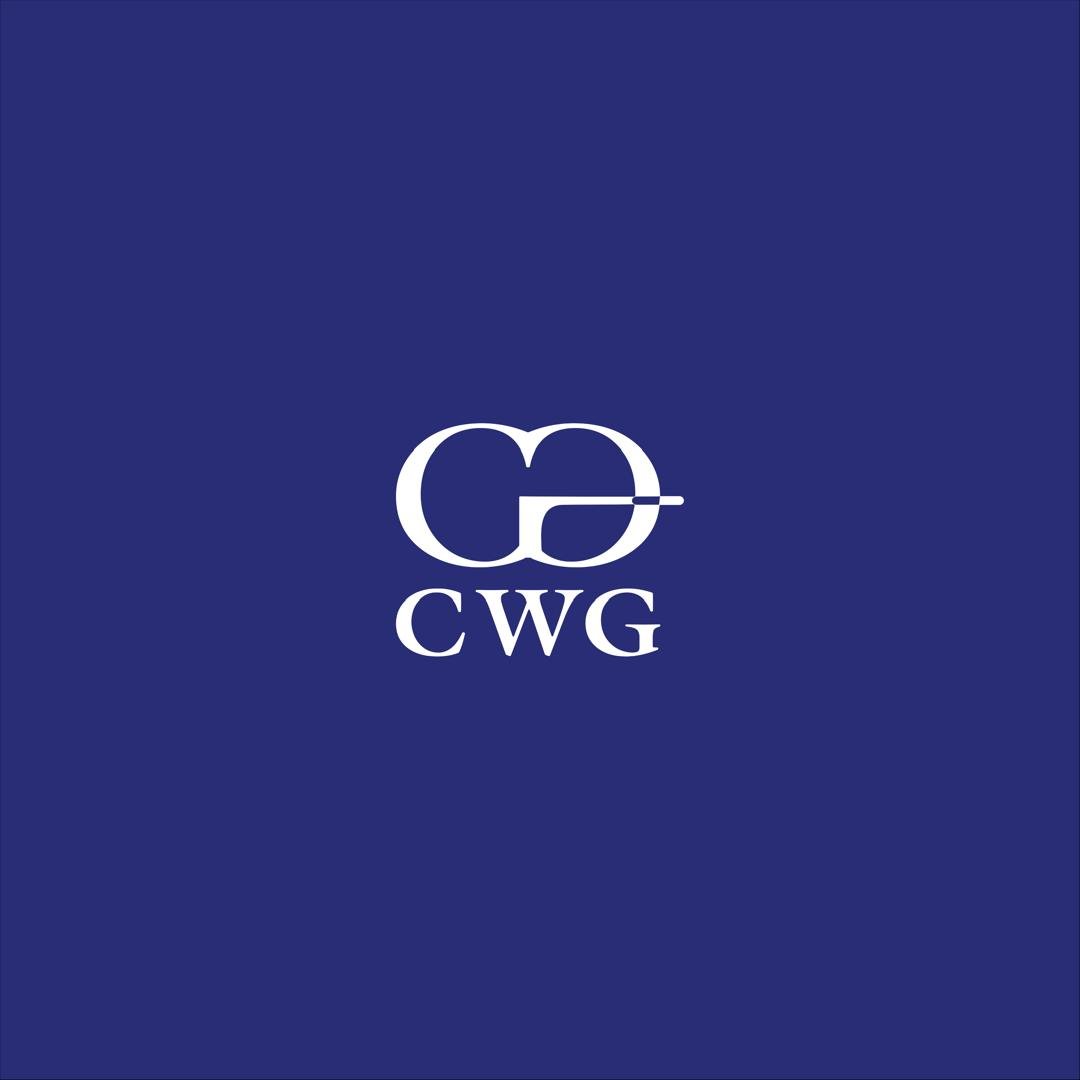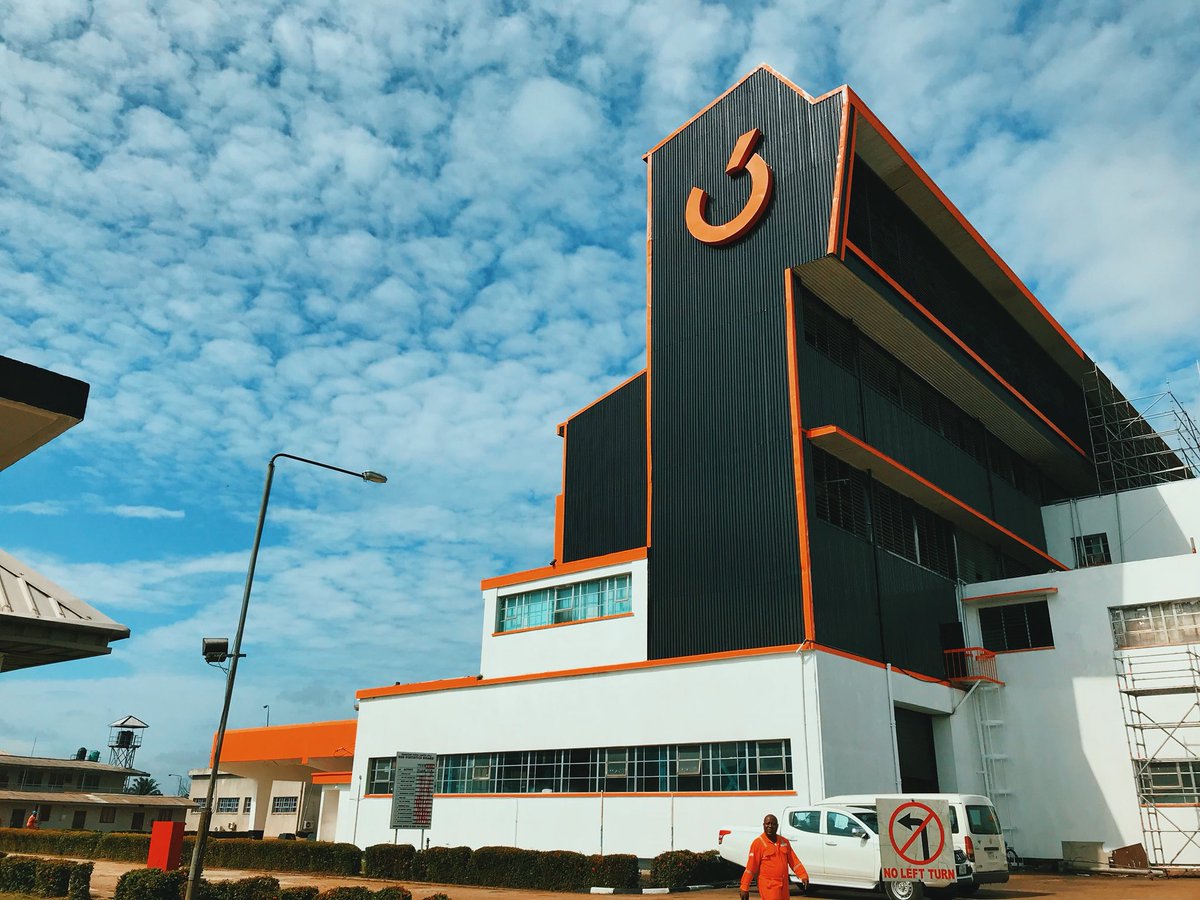
There is no doubt that capacity building efforts and continued investment by Transnational Corporation of Nigeria (Transcorp) group in the recent past have started yielding results as reflected in its recently released full-year 2017, and quarterly earnings reports released so far.
This was further demonstrated significantly by numbers contained in its unaudited financials for the nine months ended September 31, 2018, which was once again boosted by the increased capacity in the power and hospitality business segments.
Transcorp Power Limited expanded generation capacity from 505 megawatts to 701mw, and hopes to further raise it to 800mw and ultimately supply 25% of Nigeria’s power needs. Also, Transcorp Hilton is banking on increased patronage, a result of which it recently invested about $100m on infrastructure upgrade to position ahead of the ongoing political season, leading to May 29, 2019.
It may not be surprising in the midst of such ambitious target which it prepares to meet and surpass, that Transcorp Group’s turnover for the period under review grew by 40.71% to N79.56bn, from N56.76bn in 2017. This is adduced to the efficient sales and production drive which impacted on inventory size by 48% thereby freeing up returns.
Cost items continued to decline in line with management’s cost efficiency drive as shown in profit margin ratio of 20.06% up from 14.42% in the previous nine months, resulting in profit before tax of N17.72bn, a significant 96.02% growth over the N9.04 billion posted in 2017. Despite the significant 104.7% rise in tax expenses to N1.75billion, net profit stood at N15.96bn, representing 95.02% jump, when compared with N8.19bn in 2017.

Transcorp is a conglomerate, comprising distinct business divisions engaged in: hospitality, power and oil & gas sector. The numbers revealed that the power division continues to significantly impact revenue, contributing 68%, while hospitality logged 29%. The huge exposure by the group to the power business is expected to drop significantly by next financial year, when the group’s oil and gas prospecting license could become operational
Gross profit margin came in higher at 48.1%, compared to 47.6% in 2017, and better than the 45.3% of second quarter 2018, indicating improved production efficiency, while the 16.3% Quarter-on-Quarter drop in the costs of gas and other fuels for the power plant significantly accounted for the decline in cost of sales (-11.9% QoQ) in Q3’18. Effective Earnings Per Share (EPS) for the period, based on the above reported net income, came to 39kobo, compared to 20kobo in Q3 2017.
These numbers produced Earnings Yield of 31.42% over the current market price as at the release date of the financials, even as Book Value improved to N2.70, up from the N2.35 achieved in the corresponding nine months of 2017. Investors’ waiting period has dropped significantly on the strength of the improved earnings power and now stands at 1.06x, from the 2.32x in the comparable period.
Given that management has effectively improved on the group’s track record, surpassing the 2017 full-year performance level in Q3 of 2018, we expect a higher payout at the end of the current financial year.
With the company’s Book Value at N2.70, we have conservatively valued each unit of Transcorp Plc at N3.80. And recommend a Buy, for traders and investors seeking to play the stock by its trend and expected 2018 full year performance.
Technical View
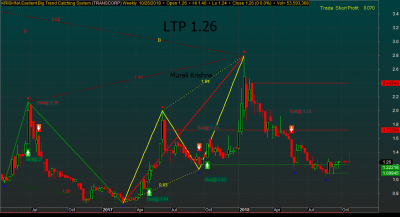
The price action revealed that the stock have been trending down since January 19, 2018 to recent reversal in August 31, 2018 forming invert head and shoulder chart pattern that support uptrend. Market sentiment before the ongoing earnings season have been negative due to weak economic fundamental and political risk as revealed by price action of Transcorp. With the current retracement wave and improving fundamentals of the company, market players should look the way of the stock. Investors with long investment perspective should key in at this low price.
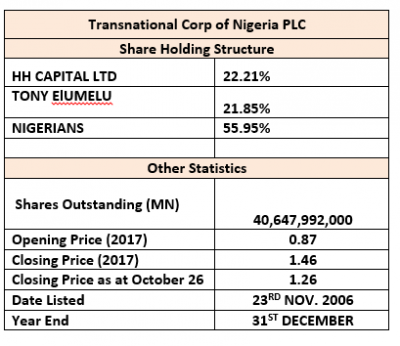
Company History
In the power sector, Transcorp Power Limited (TPL) is the entity that resulted from the merger of Ughelli Power Plc (UPP) and Transcorp Ughelli Power Limited (TUPL) (both located in Delta State) in November 2015.
Note: In 2012, TUPL won the bid to acquire UPP, one of the six power generation companies of the unbundled Power Holding Company of Nigeria (PHCN) when it was privatised by the Federal Government. TPL has successfully increased the plant’s functional capacity from pre-acquisition level of 169mw in November 2013 to 634mw, which is close to pre-acquisition maximum capacity of 670mw set by the Bureau of Public Enterprises (BPE) with plans to grow it to over 3,000mw over a five-year period.
Transcorp Hotels Plc is the group’s hospitality subsidiary and currently owns Transcorp Hilton Abuja and Transcorp (Metropolitan) Hotels Calabar. In addition,Transcorp has signed a management agreement with Hilton Worldwide to commence the development of a Transcorp Hilton Ikoyi, Lagos, as well as the Transcorp Hilton Port Harcourt. The completion of strategic expansion projects to upgrade current hotels and develop new hotels will result in Transcorp having the largest number of hotel rooms by any investor in Nigeria.
In the oil & gas sector, Transcorp Energy Limited, a fully owned subsidiary, established in 2008, oversees a joint venture agreement with Sacoil Holdings Limited (Sacoil) to develop its OPL 281 asset in collaboration with Energy Equity Resources Limited (EER). Production is expected to commence on this asset before the end of 2018
2018 Performance Analysis
On quarterly basis so far, the company’s earnings power continues to trend up from its Q1 position of 16 kobo EPS, to 27 kobo by half-year, and 39 kobo in the nine-month period, driven by the nature of its service in driving consumer and national economic activities. Arising from the forgoing, we project 2018 full year EPS to be in the region of 50 kobo, with a dividend possibility of 10 kobo per share in the bid by management to remain prudent. while creating value for stakeholders.
Five Years Performance Analysis
Transcorp’s performance over the past five years has been mixed and unstable, reflecting the different challenges it faced under previous owners and managements, especially in the its tortuous formative years during which its price collapse from N10 each, to 50 kobo, which was then the floor. There was however a turnaround in 2017. Revenue recorded a CAGR of 65.31% between 2013 and 2017. Notably, growth here was impacted by the power division’s contribution, resulting from the Ughelli Power acquisition in 2013.
Book Value expanded by a 5-year CAGR of 10.42% from N86.68bn in 2013, while historical dividend payout revealed inconsistency since it started paying in 2013, indicating that the Company has rewarded its shareholders three time in the last five financial year.

Estimated Performance Ratios
Transcorp’s Earnings Per Share for the five-year period has been undulating, reflecting the unstable business environment in the various sectors the company operates in. The amount earned per share increased from 18 kobo in 2013 to 26 kobo in 2017 after declining first to 9 kobo in 2014 and then 5 kobo in 2015, before sliding into negative position of 3 kobo in 2016. The relatively low price and improving earnings have reduced investors waiting period to 7.09x at the market value as at released date, after it had recorded a high Price/Earnings Ratio of 41.01x in 2014.
Book value for the period has grown from 2.24 in 2013 to 2.35, which is reflecting a fair value at the market price. Other performance ratios are mixed while some are looking down, especially the Return On Capital Employed and Profit Margin, indicating high cost of operations before reversing up on improved earnings performance in 2017.
